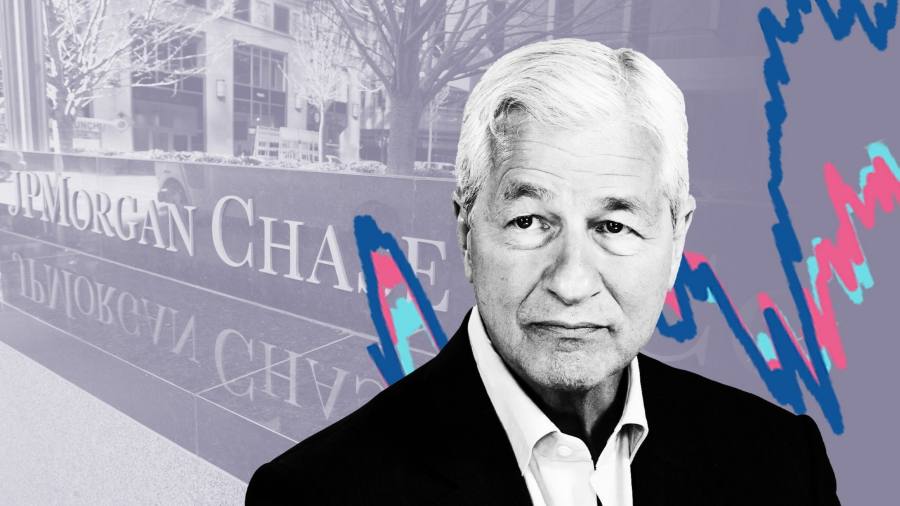This time last year, Jamie Dimon was preparing for JPMorgan’s investor day at a rare moment of weakness, with shareholders raising concerns over the bank’s $15bn investment plans and rebelling against his pay.
Fast forward 12 months and the longest-serving big bank chief executive on Wall Street is heading into the same event having apparently regained his mojo, buoyed by the acquisition of the remnants of First Republic and a shareholder base that is far less restive. This past week, his pay secured the backing of almost 90 per cent of investors.
Dimon has been in his element acting as Wall Street’s unofficial ambassador to Washington on the recent regional banking crisis and during the debt-ceiling debate. People close to the 67 year old, who is often said to thrive during crises, describe him as having an extra spring in his step in recent months.
Indeed the past 12 months might have been seen as one of the better periods of his almost two-decade tenure were it not for the drip-drip of damaging revelations from two lawsuits related to the bank’s relationship with the disgraced late financier Jeffrey Epstein.
Now as Dimon prepares to address shareholders at this year’s investor day, he has to convince them that the bank — the biggest in the US — still has plenty of room to expand.
“There’s no reason for us to think the company can’t continue to grow and leverage economies of scale, and just continue to serve their existing customers with more products and acquire new customers,” said Jason Goldberg, banking analyst at Barclays.
The bank’s shares have outperformed the benchmark S&P 500 and the KBW banking index in the last year, and has emerged as one of the winners in the recent regional banking crisis. In a research note this week, Wells Fargo analysts estimated JPMorgan’s market capitalisation could more than double within seven years to $1tn, reaching a level that has been the preserve of tech and oil companies.
“They seem to have been a beneficiary of deposit inflows in the wake of the banking turmoil that occurred in March with the failures of Silicon Valley Bank and Signature Bank,” said John McDonald, senior analyst covering large-cap banks at Autonomous Research.
Despite the optimism, the Epstein lawsuits loom large. Dimon is scheduled to be deposed in the case later this month. The judge handling the litigation will rule shortly whether or not one of the plaintiffs, an alleged Epstein victim, can expand her case into a class-action lawsuit.
JPMorgan is also dealing with the fallout from its $175mn acquisition of student financial planning start-up Frank; the bank subsequently alleged vastly overstated its user numbers. Dimon described the deal as a “huge mistake”. Frank’s founder Charlie Javice was this week formally indicted on charges that she defrauded the bank, but the episode has raised questions about JPMorgan’s due diligence.
Part of JPMorgan’s growth has been teed up by investments that had come under fire from shareholders. This time last year, they were questioning the bank for failing to outline in more detail the rationale for spending $15bn, an error which Dimon tried to rectify last year.
“They’ve had the luxury of being such a strong bank for a while that they’ve been constantly investing in the franchise, probably more than any other bank,” said David Konrad, an analyst at Keefe, Bruyette & Woods.
Analysts now say the spending on initiatives including cloud computing, hiring and marketing is starting to result in market share gains. “What JPMorgan has proven over this past year, is that they’re generating nice returns on those investments,” said Erika Najarian, banking analyst at UBS.
At the investor day, Dimon will be joined by leaders of the bank’s four business divisions, who are expected to deliver presentations on corporate and investment banking, consumer and community banking, commercial banking, and asset and wealth management.
Analysts expect the presentation from consumer and community banking co-heads Marianne Lake and Jennifer Piepszak to shed further light on JPMorgan’s deal for First Republic in April. The acquisition increases JPMorgan’s presence in wealth management, one of the few areas where it is not a dominant player.
Analysts are also hoping for an update on JPMorgan’s digital-only international consumer bank that began operating in the UK in 2021. The bank disclosed last year that it expects to lose more than $1bn in the next few years on the effort before breaking even by 2028.
If Dimon is still CEO by then, he would have held the job for more than 20 years. He has given no indication that he plans to step down any time soon and he stands to earn a projected $50mn if he is still in charge by 2026.
Nevertheless, investors will look to the investor day as a chance to size up potential internal candidates who could take the reins from Dimon.
“Investor day remains one of the best windows to evaluate JPM’s broader management line-up,” Autonomous Research analysts wrote in a note this week, “and think about who will eventually succeed Mr Dimon.”
Read the full article here




